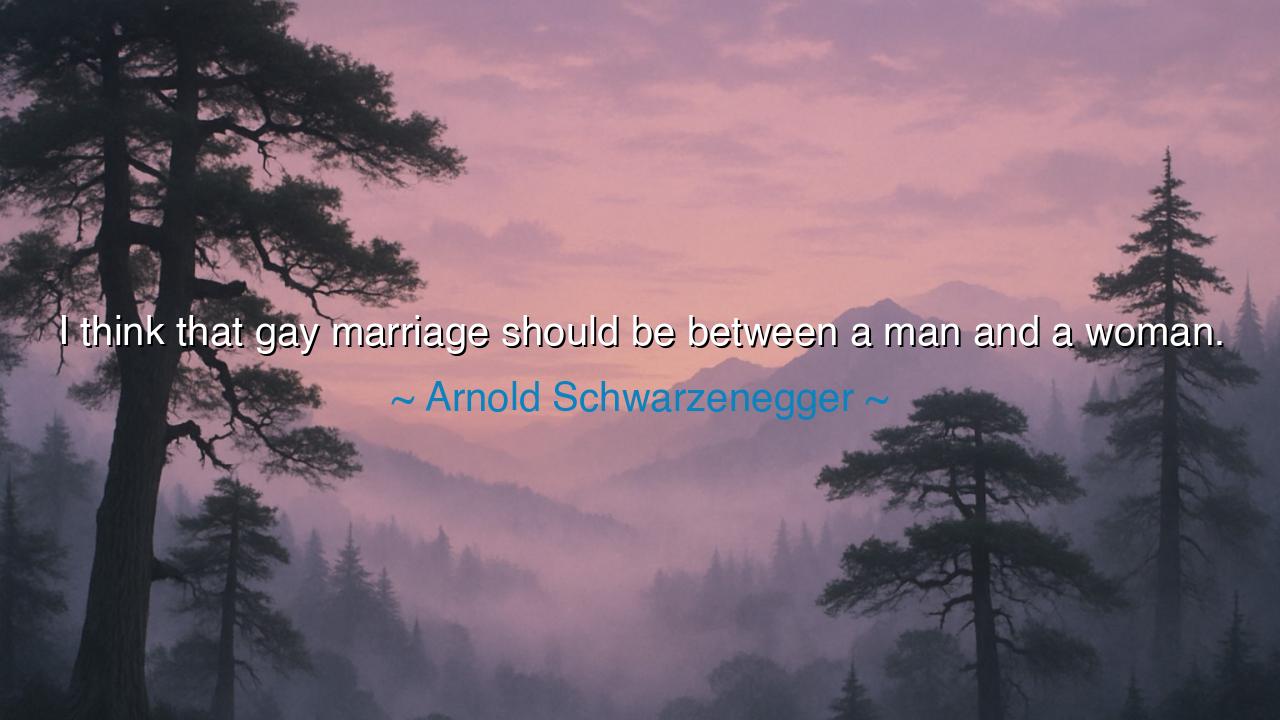
I think that gay marriage should be between a man and a woman.






The words of Arnold Schwarzenegger, “I think that gay marriage should be between a man and a woman,” are curious and paradoxical — a statement that, on its surface, seems to contradict itself, yet beneath it reveals the deeper struggles of an age in transition. Spoken during a time when societies across the world wrestled with the meaning of marriage, tradition, and equality, this quote embodies the tension between old belief and emerging understanding. In its awkward phrasing lies the echo of generations grappling to reconcile long-held customs with the dawn of new compassion. It is the voice of a man raised in one world but standing hesitantly at the threshold of another.
To grasp its meaning, we must remember who Arnold Schwarzenegger was and when he spoke. Born in postwar Austria, he rose through determination and ambition to become not only a symbol of physical strength but also a political leader in the United States. His views, like those of many of his time, were shaped by cultures where marriage had always been defined in the narrow frame of man and woman, bound by the laws of church and custom. Yet as governor of California, he stood amidst one of the fiercest moral and political debates of his era — the rise of the movement for same-sex marriage. His words, spoken in uncertainty, reflect the struggle of a world shifting its moral compass, where even powerful men found themselves unsure of what “progress” truly meant.
The ancients, too, faced such moments of transformation. In every age, humanity has had to choose between the comfort of tradition and the courage of truth. When Socrates challenged Athens to question the definitions of justice and virtue, he too met resistance, for to question deeply is to unsettle the ground beneath one’s feet. In the same way, the modern debate over marriage equality forced humanity to reexamine not just laws, but the very essence of love, partnership, and dignity. Schwarzenegger’s statement, though flawed, stands as a relic of that uneasy passage — the confusion of one awakening to new moral light but still bound to the language of the old world.
As history advanced, the tide of equality did not stop. The world moved forward, often led not by the powerful, but by the courageous and the marginalized. In 2015, when the United States Supreme Court legalized same-sex marriage, the principles once dismissed or misunderstood became law — a realization of the ancient truth that love, when true, is beyond the grasp of definition or decree. It was a victory not of rebellion, but of recognition — that to honor love is to honor the divine essence within all beings. What Schwarzenegger’s quote unwittingly revealed was the fear that often precedes understanding — the fear that changing definitions may erode morality, when in fact, they may restore it.
We can learn much from such contradictions. For every era produces its own confusions, and progress is rarely born in clarity. It arises from tension, from the clashing of ideas, from the hearts of those who cannot yet see, but who are being prepared to see. The ancient prophets spoke in riddles for this reason — truth must disturb before it enlightens. In the same way, Schwarzenegger’s remark reminds us that human understanding evolves not in leaps of perfection, but in stumbles and missteps, in words that reveal more about our uncertainty than our conviction.
Yet, even in his confusion, one can sense a deeper yearning: the desire to preserve something sacred in marriage — that it is not to be mocked, nor made trivial, but treated as a profound covenant. On that point, even those who disagreed with his definition could find common ground. The evolution of society’s understanding of marriage did not destroy its sanctity — it deepened it. For what is holiness if it excludes those who love sincerely? The ancients would remind us: that which is just cannot be unjustly denied.
Let this, then, be the lesson of Arnold Schwarzenegger’s paradoxical words: that even in error, humanity reveals its longing for order, its struggle to align morality with compassion. We must listen not only to the correctness of one’s speech, but to the spirit behind it — to the trembling of a world learning, yet again, what it means to be human. For the path to justice is not straight but winding, marked by misunderstanding, humility, and growth. And if we walk it with patience — seeking always to balance truth with mercy — we may yet reach that place where love, in all its forms, stands equal before the law and radiant before heaven.






AAdministratorAdministrator
Welcome, honored guests. Please leave a comment, we will respond soon